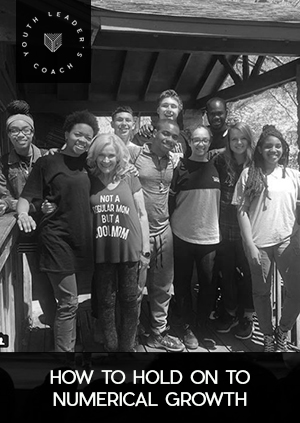Your Secret Allies
When you first move to a new town, how do you find out where all the teenagers are "hanging out"? When was the last time you privately invited a small group of students to help you brainstorm or launch an outreach or a change in your youth group? If you haven't, I guarantee you're missing out on what could potentially be your secret allies.
As the years go by, I realize that staying in touch with culture requires having students continually give me feedback. I can't tell you how many times I've said, "Ok, gang, tell me if this sounds cool or not." Granted, I have learned to recognize what is pretty "cheesy," but for fresh, relevant ideas I am the last one to discredit the ideas of the students.
I think sometimes in youth ministry we wear ourselves out trying do it all on our own, and find our levels of creativity are not what they used to be. The truth is the more feedback you get from your students, especially your sharper ones, the more you'll find your students connecting with you. You'll also find along the journey that through taking the time to ask students for theirinput, you'll gain some loyal allies among your youth group who will support you through both your successes and your failures.
In the business world this feedback tool is more formally known as a focus group. In a book called, The Tipping Point, by Malcolm Gladwell, it's referred to as hosting "Paul Revere Meetings." [I discuss how to host these and much more in my book, Thriving Youth Groups.] Call them whatever you want; the important thing is that you're recruiting your own allies to give you insight into what your teenagers are gravitating towards and how you can effectively connect with the group and ultimately bring them closer to Jesus.When you first move to a new town, how do you find out where all the teenagers are "hanging out"? When was the last time you privately invited a small group of students to help you brainstorm or launch an outreach or a change in your youth group? If you haven't, I guarantee you're missing out on what could potentially be your secret allies.
As the years go by, I realize that staying in touch with culture requires having students continually give me feedback. I can't tell you how many times I've said, "Ok, gang, tell me if this sounds cool or not." Granted, I have learned to recognize what is pretty "cheesy," but for fresh, relevant ideas I am the last one to discredit the ideas of the students.
I think sometimes in youth ministry we wear ourselves out trying do it all on our own, and find our levels of creativity are not what they used to be. The truth is the more feedback you get from your students, especially your sharper ones, the more you'll find your students connecting with you. You'll also find along the journey that through taking the time to ask students for theirinput, you'll gain some loyal allies among your youth group who will support you through both your successes and your failures.
In the business world this feedback tool is more formally known as a focus group. In a book called, The Tipping Point, by Malcolm Gladwell, it's referred to as hosting "Paul Revere Meetings." [I discuss how to host these and much more in my book, Thriving Youth Groups.] Call them whatever you want; the important thing is that you're recruiting your own allies to give you insight into what your teenagers are gravitating towards and how you can effectively connect with the group and ultimately bring them closer to Jesus.Related Items
While we all know numbers are not the only factor, or even the strongest factor, in determining the health of your ministry, it is also true that we can't make an eternal difference in an empty chair. In this Youth Leader's Coach we are talking about one of youth ministries' most puzzling topics, "How To Hold On To Numerical Growth."
So grab your coffee and join me as we talk about a few key pragmatic ways to get kids in the door and keep them.
Still Growing 1% at a Time,

Youth Ministry Basics is eight pragmatic teachings with informative "how-tos" that have consistently made significant differences in my youth ministries over the years.
If your youth ministry is larger than five or six, you will need to recruit leaders to help you. Even Jesus only had 12 in His youth group! But the challenge is finding volunteer leaders to come alongside you.
Before I had a single leader, I made a list of five names that I saw as potential leaders. My “big five” weren’t even a part of the youth ministry, nor did they show any interest in getting involved. This Youth Ministry Basics Resource outlines exactly how I have been able to find good leaders, cast vision to them and get them to stick.
Lovingly,

Youth Ministry Basics is eight pragmatic teachings with informative "how-tos" that have consistently made significant differences in my youth ministries over the years.
A Point Guard is "the person who finds the holes in the defense to best execute a winning strategy." Is your defensive strategy a little off? Well, I can honestly say that without our Point Guard team, our defense would be a little off. I cannot tell you what a difference this team makes for us each and every ministry night! These kids come expecting more out of our youth ministry, because they now feel a part of the team. They realize through a friendly smile, a handshake, a high-five and a simple “What’s up?” they just might impact the person they are handing a flyer to. Point Guard’s mix is made up of people who are willing to be servants. They sacrifice their time and energy one ministry night a month by being the most amazing serving team anyone could ever ask for. Without their time, energy and their hearts, our ministry would not be the same.
This Youth Ministry Basics Resource will give you simple strategies to recruit your Point Guard team, train them, and keep them motivated to come back week after week.Lovingly,

This month's Youth Leader's Coach, "The Church's Frightening Kodak Moment," is one you don't want to miss! The number of men, women, and children in American pews has dipped to the lowest level since a comprehensive effort to count members began in 1980, according the most recent surveys. Why? Because churches have been reluctant to change, clinging to the past, no longer being able to focus on the true mission of the church – helping people come to know Jesus Christ in a real way and grow in discipleship.
I share a fascinating parallel between the fall of Kodak and some strangely similar trends now occurring in the 21st Century Church. Even more strategic, are some simple steps that individual churches can take to reverse the stagnating spiral. The warning signs and the research-based suggestions are incredibly challenging and thought-provoking.
Lovingly,






